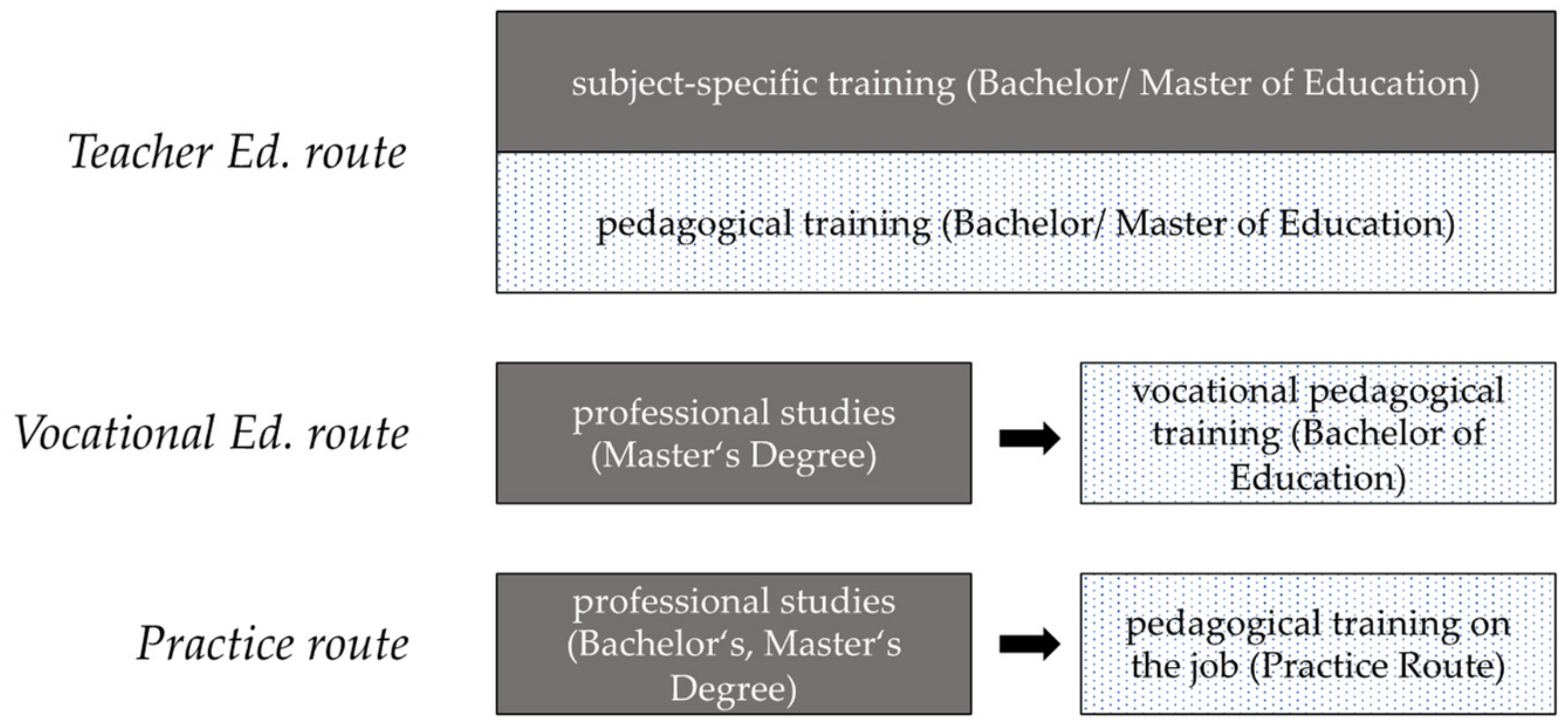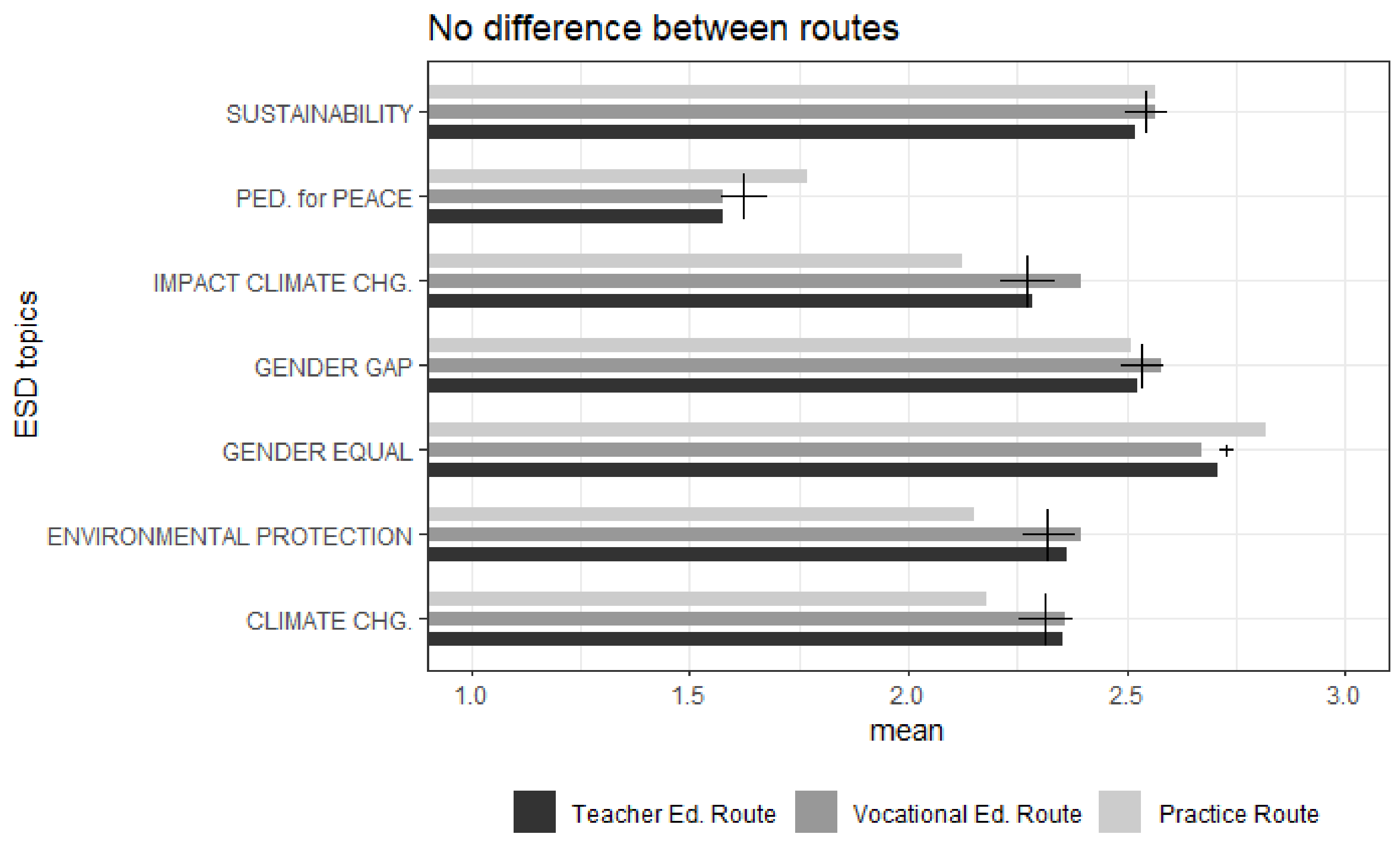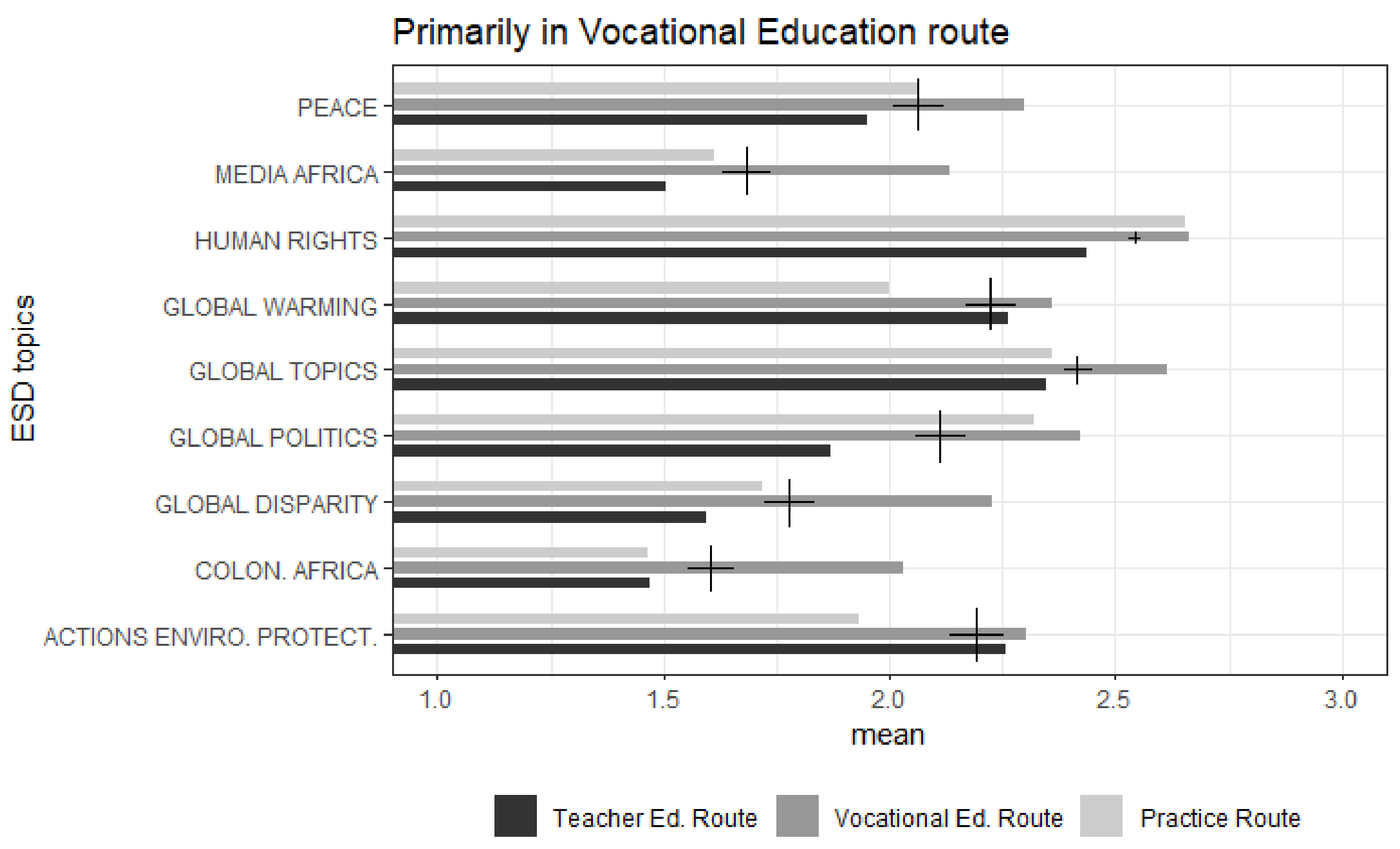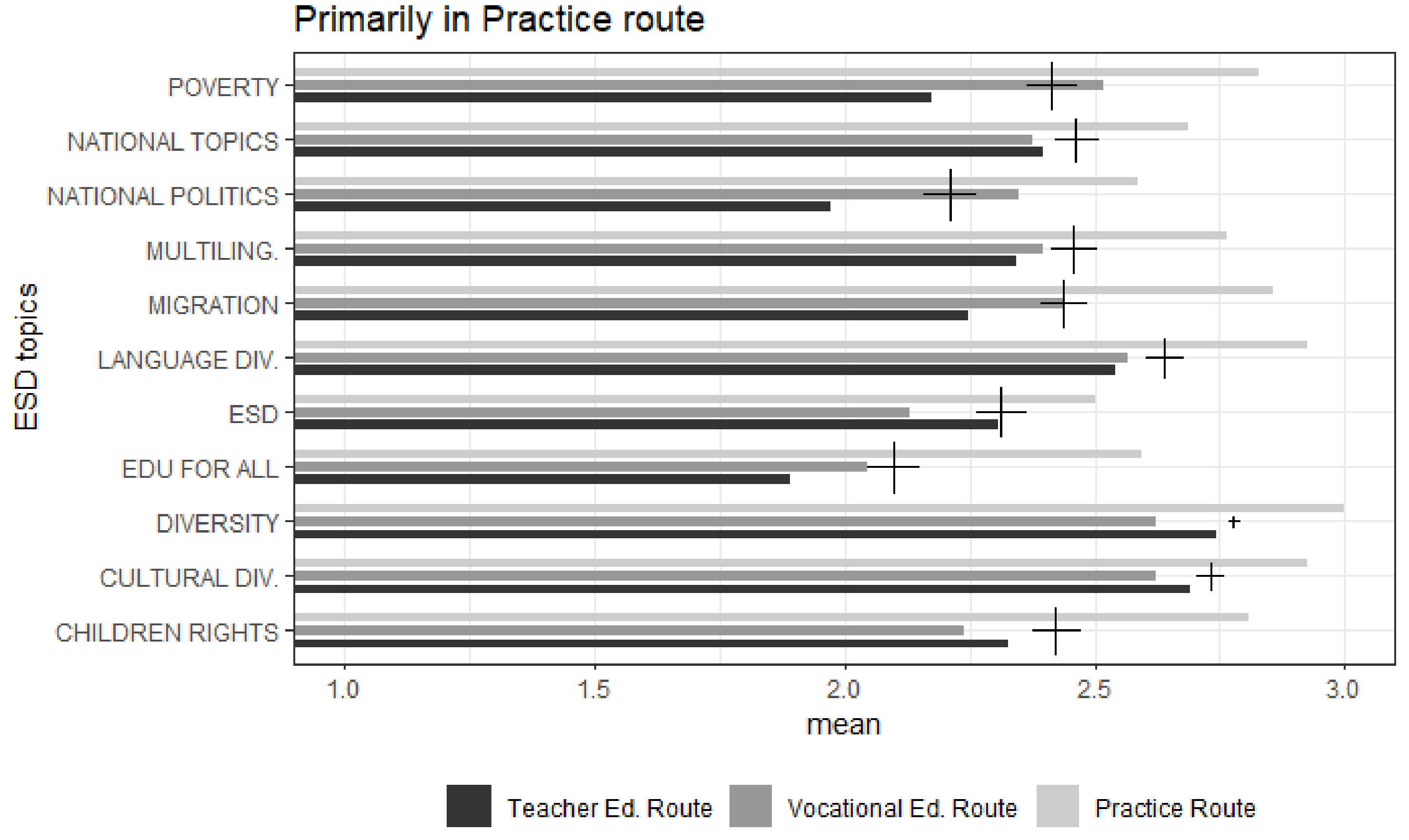Abstract
Education for sustainable development (ESD) is increasingly being perceived as the educational paradigm of our time. Here, teachers act as multipliers in the dissemination of that new paradigm into practice. The question arises, however, as to how far teachers themselves are exposed to ESD issues in their initial teacher training and education. In this exploratory, mixed-methods study, we investigate the exposure of students to ESD-related topics in different routes of teacher education in Austria. We do so by means of a quantitative survey instrument, which was specifically developed for this investigation in a qualitative pre-study. Within the investigated routes we note different distributions of ESD-related topics. These findings serve as a starting point for deeper analyses, as well as an impetus to question existing curricula in different teacher education routes with regard to different ESD-related topics.
1. Introduction
Education for sustainable development (ESD) [1] provides a framework for supporting the achievement of the United Nations’ sustainable development goals (UN-SDGs) [2], especially SDG 4—Quality Education of the 2030 Agenda, adopted by the United Nations General Assembly UN Resolution 70/1, 2015. Successful implementation of ESD requires the networking of regional and global initiatives in order to anchor global sustainability challenges in society in a fundamental and timely manner through high-quality educational offerings.
Special attention must be paid to teacher education, as it promises to have multiplier effects that will eventually reach all levels of education. To be effective, ESD-related content must be successfully implemented in the general school system and in all subjects taught [3]. This means that teachers working in schools need to be acquainted with specific ESD-related topics [4]—and the question is how much the teachers themselves are exposed to these concepts in their own initial teacher training.
Research Purpose
In this paper, we investigate how newly qualified teachers (NQTs) become acquainted with ESD topics during their initial teacher education and training in Austria. Our primary focus will be on the distribution of relevant ESD topics across the various routes to becoming a teacher. While the importance of ESD in Austrian schools has been increasingly understood since 2016 [5] (p. 16) and a corresponding initial spark has been given by anchoring it in textbooks and other systemic efforts, we know little about how these topics are also prevalent in the different teacher education and training trajectories. Specifically, we look at three different routes to becoming a teacher:
- “Traditional” teacher education at institutions of higher education—this is the main route for the vast majority of teachers in Austria;
- Teacher education and training of upper secondary level “vocational education” (alternative route for vocational education with subject-dependent professional background);
- Lateral entry teachers without teaching degrees employed through special contracts.
2. Theoretical Background
2.1. Education for Sustainable Development (ESD)
ESD aims to empower people to make informed choices and to act responsibly to protect the environment, promote a more eco-social economy, and create a just society for current and future generations, while respecting cultural diversity in our rapidly globalizing world. The growing relevance of the global educational environment for a debate on humanization and an understanding of the living world and related fields of action led to the declaration by the United Nations of the Decade of Education for Sustainable Development from 2005 to 2014 [1]. This period also marked the beginning of increased political interest in promoting conditions for social stakeholders to act towards sustainable development. The growing political interest led to the fact that from 2005 onwards, global initiatives, such as the UNECE Strategy for Education for Sustainable Development [6], transitioning into the UN Global Action Programme and Education for Sustainable Development (2015–2019) [7], attracted increased global attention. The resolution of Agenda 2030 at the 2015 UN Climate Summit and the adoption of the 17 sustainable development goals (SDGs) allowed the lessons of the Decade of Education for Sustainable Development to be clearly articulated, concretized, and globally communicated [2,8]. An in-depth addition to contextual learning objectives and approaches, given their relevance to the education sector, was followed up with two years later [9]. In 2020, the roadmap was aligned in more detail with the target dimensions and needs of Agenda 2030 and the 17 SDGs under the overarching theme of Education 2030 [10].
For an effective implementation of ESD, international sustainability resolutions refer to the interaction of different levels of impact. The report of Johannesburg 2002, for example, describes the need to strengthen the interacting pillars of sustainability at the micro, meso, and macro levels of economic, social, and environmental development from the perspective of collective responsibility [11]. In addition to the macro level, which is mainly based on UN resolutions and global agreements, an interest in ESD implementation strategies has been established at the meso (national) and micro (regional) levels since the adoption of the 2030 Agenda. With a clear focus on the primarily German-speaking region (Austria and Germany), different scientific excursions at these levels have been observed since 2015. Bottom-up approaches, such as street-level research in regional settings [12] and state-wide status surveys in national settings [13], can help to understand the barriers to implementing high-level specifications of global implementation schemes at the actual places of impact. Schools, and especially teachers, are often seen as particularly important multipliers for implementation success. Grund and Brock (2018) showed that three years after the adoption of the 2030 Agenda, curricular embedding of ESD in teacher training programs was still seen as the biggest hurdle to successfully implementing ESD concepts in the classroom by practicing teachers in Germany [14]. Similar studies in the context of Austria are not known to the authors at this point, which is why this next section is dedicated to the history of education for sustainable development in Austrian teacher education, the specific context in which this research study is embedded.
2.2. History of Education for Sustainable Development in Austrian Teacher Education
The 2020 report on the implementation of the sustainable development goals, published by the Austrian Federal Chancellery, states a clear commitment to the fundamental strategy of anchoring the SDGs and the paradigm of ESD across the entire education sector up to the university level [5] (p. 26). First efforts to integrate interdisciplinary sustainability and environmental content into Austrian teacher education began in the early 2000s, although they were not yet under the name of ESD [15,16,17]. As early as 2004, growing pressure from the political culture to participate in the debates about sustainability and the environment led to a series of educational conferences on educational policy and scientific recommendations to consider ESD in teacher education [18,19]. Therefore, the government-supported “BiNE curriculum” for teacher professionalization was created as a multi-stakeholder output between politics and educational science to reach a consensus on the importance of including ESD in the Austrian education system.
This professionalization program for teachers in the field of ESD was jointly developed by scientists from different Austrian universities and pedagogical colleges and has been a success story across the federal states until today. In the curriculum, the dimensions of values, feelings, knowledge, and skills are emphasized. In addition to communicating and reflecting, other skills, such as developing visions, planning, and organizing, as well as networking, are fundamental competencies for ESD. In the sense of action research, participants should be prompted to lead projects at their own institutions and, with the help of reflective processes, to anchor them there sustainably through iterative improvements [20,21,22,23,24,25].
Steiner and Rauch [26] compiled a policy paper on the topic of integrating ESD into Austrian teacher education that recommends having one (compulsory) seminar in which ESD is discussed with the students as the minimum for teacher education curricula. This implies that there should be no student teachers in Austria who have not dealt with ESD at least once during one semester of their education. Today, such a course exists alongside the basic Austrian teacher training as a further training measure, but it is not obligatory in the training.
2.3. Routes to Becoming a Teacher
Teacher education and training for secondary education in Austria encompasses three essentially separate routes into the teaching profession, depending on the duration of training, the prior experience of the teacher candidates, and the type of school that they are aiming for. Specifically, we focus on three routes in this paper, which we label the teacher education route, the vocational education route, and the practice route (see Figure 1):
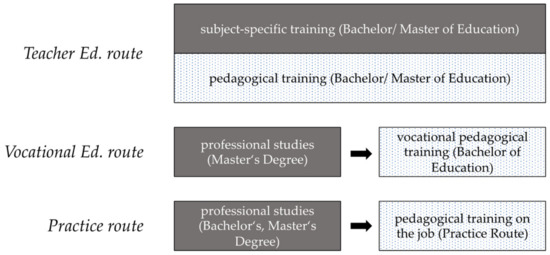
Figure 1.
Routes in Austrian Teacher training.
- Teacher education route: Teacher education and training of secondary level “general education” of all subjects; the formal training track primarily covers the compulsory school sector after four years of primary school, which is compulsory for all Austrian pupils, and the higher secondary level of general education (“new” secondary schools/middle schools, polytechnic schools/pre-vocational schools, and high schools/grammar schools).
- Vocational education route: Teacher education and training of upper secondary level “vocational education”; the unrelated formal training track enables practitioners from different subject areas (with professional experience) to acquire pedagogical postgraduate training for the higher secondary level in vocational education (upper secondary federal institutes of technology, agricultural and forestry schools, and upper secondary business schools) after completing a basic degree (master’s level).
- Practice route: Lateral entry teachers who, due to the shortage of teachers without teaching degrees, are employed on special contracts at selected, mostly socioeconomically disadvantaged school locations (secondary schools/middle schools and polytechnic schools/pre-vocational schools that receive too few applications from certified teachers).
3. Materials and Methods
3.1. Sample
In this paper, we study bachelor’s and master’s students of teacher education and NQTs in Austria and ask about their exposure to various topics relating to ESD during their studies. As indicated above, we are interested in the different pathways available to becoming a teacher, which, next to the traditional pathway of formal studies at institution of teacher education, also include routes via postgraduate teacher education for vocational training, as well as informal education.
Therefore, we sent surveys to three different types of institutions:
- Traditional institutions for teacher education to cover the teacher education route (with all 26 institutions located in Austria included in the sampling frame; n = 180);
- A college that offers a teaching license for completing vocational training in agricultural and environmental education that allows teachers to enter the profession next to those who followed the traditional curricula of teacher education (n = 79). The University College of Agricultural and Environmental Education (UCAEP) was deliberately chosen for the vocational education sample because the origin of today’s sustainability discussion and understanding is justly derived from the field of agriculture and forestry [27]. This sample was used to inform the vocational education route;
- Teach for Austria, an organization that is part of the Teach for All network, which allows individuals to enter the profession without formal pedagogical education (n = 106). Teach For Austria was added to the sample because the organization represents the largest private–public collaboration for the Austrian practice route in teacher education and training. This sample was used mainly to provide information about the practice route, but it also provided data for the second group—the commonality being that participants in both groups have studied a bachelor’s and/or master’s degree other than a traditional teacher education curriculum.
Since we are interested in the routes that individuals take, and not so much their institutional background, we rearranged this sample of 365 individuals based on their reference point for assessing their exposure to the topics of ESD, which could be:
- a curriculum of teacher education (teacher education route, n = 231),
- any other higher education curriculum (vocational education route, n = 134),
- or teaching practice (practice route, n = 106).
3.2. Instruments
We were especially interested in learning more about the respondents’ views of how much they have learned about ESD-related topics during their studies or during their initial years as teachers. In other words, we focus on the degree of exposure to the ESD-related topics; we do not measure opinions or understanding about these topics. Since there is no existing survey instrument for this, we integrated a qualitative pre-study to develop a measurement instrument ourselves. Hence, we applied a mixed-methods design, where a qualitative, preliminary study was implemented to develop [28] the measurement instrument for the subsequent quantitative main study. The survey instrument used can be seen in the Appendix A.
The aim of this preliminary study was to gain insights into ESD-related core topics for Austrian teacher education to subsequently construct the quantitative measurement instrument. Here, the orientation framework for global development education served as a reference, which anchors detailed dimensions of ESD, as well as providing instructional content for different subjects and recommendations for teacher education [29]. The orientation framework thereby contextualizes the outcome of a joint project of the Standing Conference of the Ministers of Education and Cultural Affairs of the Federal Republic of Germany and the German Federal Ministry for Economic Cooperation and Development from 2004 to 2015. The orientation framework refers to ESD content and dimensions that can be defined as a common approach in Germany, Austria, and Switzerland.
In the preliminary study, a qualitative content analysis based on the orientation framework was used to screen the core dimensions for the survey instrument. More specifically, frequency analysis [30] was applied to the data sets and identified through the software atlas.ti. A word frequency list was created based on the orientation framework [29] after removing a usual list of stop words (which includes, e.g., prepositions, numbers, or words that are without lexical meaning or unavoidable in the school context) and after aggregating similar words (e.g., “school” and “schools”).
In the next step, the key terms were cross-checked with the teacher curricula to determine whether these terms are indeed present in and relevant to the curricula. Mayring [30] lists some aspects that need to be considered in frequency analyses, such as the extension determination by context (e.g., “no fear”, “less fear”, and “much fear” would be counted once each). As a solution, all individual terms were examined in advance for their contextual binding. As an example, the item “diversity” was mostly subject to the context of culture, language, and/or method. The contextual meaning of the key terms was precisely considered when creating the items for the quantitative instrument. Another preliminary consideration while selecting key terms relates to the ecological, economic, and social dimensions of sustainability. In this context, Kropp [31] points out a general problem with the weighting of these three components, and adds that they may even be mutually exclusive in some cases. For this qualitative pre-study, the focus will, therefore, be on the social and environmental dimensions.
Last, once the key terms were identified, we cross-checked for their appearance and relevance to the Austrian educational curricula and the meso- and macro-level development dimensions described in the Johannesburg 2002 Final Report [11]. The final instrument includes 28 topics derived from the key terms with different contextual focuses which are relevant to ESD in Austrian teacher education. As an answer scale, we propose a rather narrow three-point scale that measures exposure to these topics (see Appendix A).
3.3. Analysis
To answer the research question, we need to compare the ratings of the topics across the three samples. This is achieved by the means of multiple analyses of variance; post hoc tests used TukeyHSD for corrected significance values.
4. Results
4.1. No Difference between Groups
Figure 2 lists the ESD-related topics where no (statistically significant) effects were identified between the three samples (the teacher education route, vocational education route, and the practice route). Most topics in this category are topics that currently are generally discussed a lot—also outside of the higher education curricula. They include sustainability (overall M = 2.54, SD = 0.78), environmental protection (M = 2.32, SD = 0.89), climate change (M = 2.31, SD = 0.89), the consequences of climate change (M = 2.27, SD = 0.90), and the gender gap (M = 2.53, SD = 0.79). Another topic is the pedagogy of peace, which, unlike the others, was rather unpopular across the samples (M = 1.62, SD = 0.82).
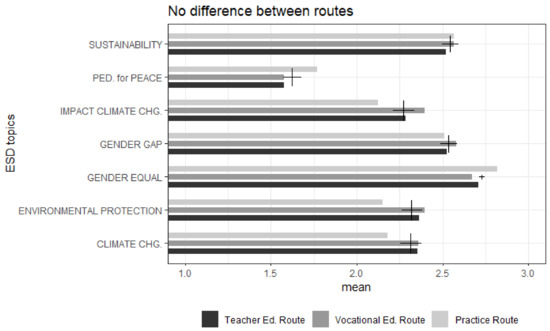
Figure 2.
Overview of the results with no statistically significant differences between routes; the plus sign marks the mean (x-axis) and standard deviation across groups (a bigger sign equals a larger standard deviation).
The participants also reported similar exposure to the sustainable development goals themselves across samples (M = 2.13, SD = 0.93).
4.2. Primarily in Vocational Education Route
As shown in Figure 3, teachers who completed studies through the vocational education route reported a higher exposure to more global topics, including disparity (overall M = 1.78, SD = 0.89; significant difference to the other two samples, F = 20.29, p < 0.01), global politics (M = 2.11, SD = 0.91; significant difference to teacher education route, F = 18.70, p < 0.01), and general global content (M = 2.41, SD = 0.80; significant difference to teacher education route, F = 4.35, p < 0.05).
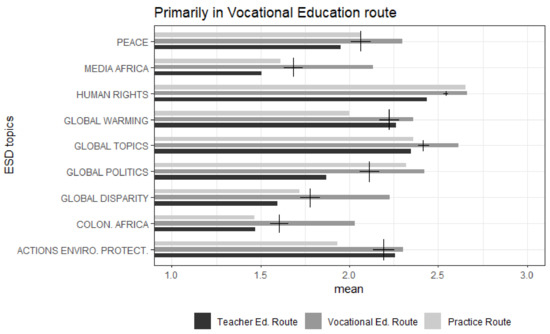
Figure 3.
Overview of the results where the route via vocational education offered more exposure; the plus sign marks the mean (x-axis) and standard deviation across groups (a bigger sign equals a larger standard deviation).
For the adjacent topics of colonialism (M = 2.03, SD = 0.97) and media about the African continent (M = 2.13, SD = 0.95), this group reported the highest exposure. The resulting differences were also statistically significant (F = 17.52, p < 0.01 for colonialism, F = 20.08, p < 0.01 for media). This is also true for the topics of peace (M = 2.06, SD = 0.91; significant difference to teacher education route, F = 5.23, p < 0.01) and human rights (M = 2.54, SD = 0.78; significant difference to teacher education route, F = 4.63, p < 0.05).
While no differences among the groups were identified for most environmental topics (see above), there were two exceptions to this, namely, global warming (M = 2.22, SD = 0.91; significant difference to the vocational education route sample, F = 4.59, p < 0.05) and measures taken for environmental protection (M = 2.32, SD = 0.89; significant difference to the other two samples, F = 5.55, p < 0.01).
4.3. Primarily in Practice Route
Those individuals referring to their teaching practice (practice route) report the highest exposure to some topics based on their practical experience in the first years of their practice (see Figure 4). This includes the topics of diversity, education, poverty, and other national topics.
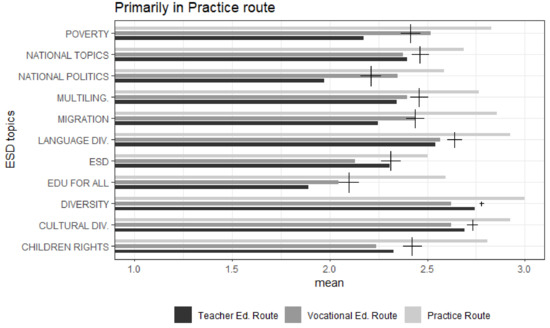
Figure 4.
Overview of the results where the route via practice offered more exposure; the plus sign marks the mean (x-axis) and standard deviation across groups (a bigger sign equals a larger standard deviation).
The broad category of diversity includes the topics of cultural heterogeneity (overall M = 2.73, SD = 0.63), language-related diversity (M = 2.64, SD = 0.72), multilingualism (M = 2.46, SD = 0.82), migration (M = 2.44, SD = 0.84), and general diversity topics (M = 2.78, SD = 0.58). For all these topics, the differences to the other two samples are all significant (F = 7.31 to 20.46, all p < 0.01).
Concerning the educational topics, this sample felt more exposure to the topics of education for all (M = 2.10, SD = 0.89; significant difference to the other two samples, F = 25.59, p < 0.01) and ESD (M = 2.31, SD = 0.87; significant difference to the vocational education route sample, F = 4.81, p < 0.01).
Poverty was also a topic with great exposure for this group (M = 2.41, SD = 0.85; significant difference to the other two samples, F = 25.46, p < 0.01), as was children’s rights (M = 2.42, SD = 0.84; significant difference to the other two samples, F = 15.81, p < 0.01).
This group also reported a higher exposure to more local and national topics. Specifically, this included information about national governments (M = 2.21, SD = 0.92; significant difference to the teacher education route sample, F = 19.20, p < 0.01) and general national contents (M = 2.46, SD = 0.79; significant difference to the other two samples, F = 5.93, p < 0.01).
4.4. Primarily in Teacher Education Route
According to the data, none of the categories from the developed instrument were reported to have the highest exposure among students of the traditional teacher education route. Curiously, however, one related question where this group scored highest was an introductory question whether they are aware of the sustainable development goals (“1” = yes, “0” = no), in general. Here, the students of the regular teacher education route programs reported the highest awareness (84% indicated awareness), and the differences to the two other groups are statistically significant (F = 4.30, p > 0.05).
5. Discussion
We set out to describe how different routes to becoming a teacher affect exposure to central ESD concepts. Overall, our exploratory, two-stage mixed-methods design was able to determine the initial implications for the presence of ESD topics in three different routes to becoming a teacher in Austria. The underlying sample showed that the ESD topics had different ranking effect sizes in the different education and training programs. Interestingly, the general teacher education route group was most aware of the SDGs and Agenda 2030 topics. However, for all other key categories surveyed, the two more specific education and training programs demonstrated a higher presence of these topics with significant results. One possible explanation for this could be that the SDGs have an emerging presence in the field of prospective teachers due to their omnipresent media and public attention (non-scientific articles in journals, Ministry of Education broadcasts, and lectures in the field of education) with SDG4—Quality Education. However, the actual inclusion of content dimensions in studies could still be increased in all areas.
Remarkably, the other two—arguably more specific—programs showed stronger profiles with the distribution of key topics. The group taking the practice route showed the greatest significant differences in national, social, and specific themes of cultural diversity, poverty, and migration throughout the two-year lateral entry program. The relevance of this content to the accompanying teacher education also accurately describes the target action areas of the organization that provided the sampling frame in this study (Teach for Austria). The vocational education route showed significant differences in key global issues, such as global governance issues, disparity, and the media image of Africa and colonialism, alongside the environmental content of global warming and action to protect the environment. Despite no further disaggregation at the level of the underlying subject studies, these findings reveal clear differences in ESD-related subject content that demonstrates subject-specific higher relevance in different target school types for teachers.
The findings confirm that ESD topics are already present in a variety of ways in different programs with differing degrees of relevance. In the sense of Agenda 2030, this circumstance shows that the entire breadth of topics is difficult to map in individual programs, since in some areas subject-specific know-how and a target school form-relevant background are essential.
5.1. Primarily in Practice Route
The sample that referred to the ESD-related topics was made up of NQTs trained by Teach for Austria (TFA). It is not a surprise that they scored highly on national educational and political ESD issues, as this basic approach is reflected in the understanding of the globally active Teach for All network, whose core competence focuses on alternative teacher training to improve educational equity. The network, as of 2021, includes affiliate organizations in over 60 member countries that make notable contributions to the education system in their respective national settings [32]. The overarching goal of the program is to promote equity in education systems in different countries in collaboration with professional teachers. With respect to Austria, the goal of TFA is to address and improve the unequal distributed equity of opportunity in Austrian education, which remains highly dependent on family background and social environment [33].
The important topics during the training of TFA mainly includes the ESD-related items education for all, poverty, children rights, and migration next to the item national government, which show the largest effect sizes within the practice route.
In this regard, it is important to highlight the motivational background to join the teaching profession, which in the case of TFA fellowship teachers is grounded less in the professional interest of teaching the subjects themselves but rather in the social dimension [31]. The principal didactic and pedagogical suitability of fellowship teachers in comparison to basic trained teachers was further supported in the European Erasmus+ project, “A New Way For New Talents in Teaching”, conducted in five countries [34]. The relevance of key ESD dimensions in the training of TFA fellowship teachers, which are shown with regard to the present study, thereby fulfill the demands for a variety of social topics on a meso and macro level, and therefore foster educational transformation.
5.2. Primarily in Vocational Education Route
Those entering the teaching profession with a university degree outside of the field of teacher education became most acquainted with topics such as global disparity, media image of Africa, colonialism of Africa, and global government issues. This reflects the findings of Abs et al. [34] that over 75% of the practitioners with a professional studies background either studied or worked abroad at times and thus had more international experiences compared to regular teachers. Likewise, it appears that in the context of global issues, “social responsibility” is the strongest motivator for the teaching profession among practitioners (TFA), compared to “subject-specific motivation” among formally trained teachers (control group), and it holds a correspondingly high intrinsic value for understanding these issues [34] (p. 95). In addition to the global, socially connotative topic areas, the two key ESD-related areas of taking action to protect the environment and global warming have the largest effect sizes. An interesting finding is the significant result of this group regarding the items taking action to protect the environment and global warming compared to the non-significant results of the items environmental protection, climate change, and consequences of climate change for all groups. Whereas the first two target dimensions show a clear ESD-specific dimension of intrinsic “evaluating” and “acting” [29], the latter three can be assigned to an elementary “recognition” in the sense of ESD. The relevance of taking action to protect the environment and global warming in teacher education for the school sector of vocational education in the agricultural and environmental sector legitimately carries a high value for this target group. Therefore, the UCAEP participates in a number of different European Erasmus+ funded development projects in the agricultural and environmental sector, such as UniClad (enhancing the capacity of universities to initiate and to participate in clusters on development in innovation and sustainability principles) [35], Agritrain (Train the Trainer for a Sustainable Agriculture) [36], or SoFarEdu (Social Farming in Higher Education) [37]. Many of the target themes have an urgent global dimension and seem irrevocable in relation to ESD-enabled teacher education in today’s world. In addition, synergies from different countries provide added value for students, the university itself, and scientific progress, enriching the teaching–learning experience for prospective teachers in vocational education.
For both the topics where practitioners and individuals with a background in other studies indicated the most acquaintance, future research could not only pose the question as to why this is the case (although we have made a start and offered some explanations above), but also as to whether more balance across the routes of becoming a teacher is a desirable goal. For higher education professionals, the question becomes what could be learned from these differences.
5.3. No Difference between Groups
No significant results were observed for some key topics. This circumstance can potentially be due to a certain precision of the question dimension or to an over-generalization of complex topics that cannot be sharply separated. A good example is provided by the item sustainability, since this term is inflationary and understood as a synonym for “good” in today’s world, and is often used blurrily regarding its original forestry meaning for resource equity across generations. Furthermore, sustainability is often used as a connotation in the most diverse areas as a sales argument, or legitimation for the implementation of processes, projects, or other ventures. Likewise, no significant differences were found for environmental protection, climate change, and consequences of climate change, which can be attributed to the great media attention these topics have received in recent years. It is very likely that these topics are present in some way in all routes towards becoming a teacher and therefore do not provide significant differences. The item pedagogy of peace has no significant differences between the different groups, nor was it assessed by the students and NQTs as really present in teacher education. Peace education as a part of the subject “civic education” is anchored in the school curricula in Austria, but it hardly reaches the reality in school practice, because it has been insufficiently implemented and there is no mandatory teacher training and continuing education in this area in Austria. There is an increasing debate about whether peace education, global learning, and democracy education are merely sub-disciplines of civic education. Here, a sharpening of the terms and the contents behind them would be necessary, whereby until now all actors are required to do this conceptual and definitional work themselves [38]. The fact that the sustainable development goals themselves are not yet widely disseminated and included in teacher education may be related to the fact that they were only adopted by the UN in the last quarter of 2015 and the time since then still seems too short for them to have been sufficiently integrated.
5.4. Limitations and Implications for Research
In this section, we discuss the meaning of the descriptive finding offered here with respect to avenues for further research. Given the exploratory and cross-sectional nature of the project presented here, further research is necessary to increase the robustness and generalizability of the findings presented and to find (more causal) explanations for the data. Specifically, future research could improve on the measurement and the sampling. Concerning measurement, two directions seem especially important. First, a general measurement instrument could be developed that gauges exposure to ESD-related topics more accurately and completely. In this study, we have used a mixed-methods approach with a developmental, qualitative pre-study to make up for the fact that no such instrument exists at this point. However, while we believe that the measurement instrument produced by this qualitative component was useful for our study, it might not be enough going forward. Second, our measurement instrument focused quite narrowly on the concepts related to our research question. We do not have a lot of information about any pedagogical experience outside the teacher education and training programs discussed in this study (as this was not our aim). However, obtaining more biographical information about learning trajectories and competencies might be useful to understand the topic more thoroughly. A next step in this context could be to collect more details regarding the individual contact to ESD topics through subject-specific study background and/or professional contextual knowledge. In the case of the vocational education route, these results could shed light on whether prior biographical knowledge of student teachers might lead to overall higher exposure concerning ESD core topics compared to the more curricular predefined (general) teacher education route.
Concerning sampling, we have focused on a relatively narrow set of organizations that we believe to represent the available routes for becoming a teacher in Austria very well. The finding that no specific item with the highest expression (except for the SDG item) occurred in the most frequently chosen traditional education route compared to the other routes should prompt further in-depth research. Derived from this, the fundamental question arises as to whether a deeper anchoring of the ESD core topics seems possible at all in the traditional education route due to an already extensive number of curricular requirements that must be completed in parallel. However, especially for the “alternative” routes outside studying teacher education curricula at institutions of higher education, a plethora of options exist (although all of them are of very small size). Future research could also concentrate on a broader and more international approach to sampling to see in how far the results of this exploratory study are generalizable.
5.5. Implications for Practice
The findings of this exploratory study suggest a few implications for (teacher education) practice. Discussion is needed about the topics where exposure was reported at (relatively) low levels. These blind spots could serve as a starting point, similar to an approach carried out in Vietnam [39], to identify ESD-related courses within low-level exposure areas throughout the curricula of universities in the four major Austrian educational networks. Further inspired by this study, a credit-based elective system for ESD courses could be introduced among the different educational institutions within one educational network, making a certain number of self-selectable courses of different ESD dimensions mandatory in this regard. Moreover, our explorative study shows that content-related ESD topics (for example, taking action to protect the environment and global warming) were significantly more prevalent among students at the specialized institution in the vocational education route (agricultural and environmental education teacher training) than in the traditional education route. Taking this into account, the existing educational networks in Austrian teacher education can provide a basic framework for increased inter- and transdisciplinary cooperation between the various training institutions focusing on different (ESD-related) subject-specific expertise.
A further finding indicates that a few ESD-related topics—although prominent in the guiding texts which our measurement instrument was based on—did not appear prominently during teacher training irrespective of the route taken. This indicates that there might be blind spots regarding key ESD pillars in all routes to becoming a teacher in Austria. A cross-university evaluation of all the educational institutions of all four Austrian educational networks is needed to estimate whether a more explicit inclusion in teacher education and training may be useful.
5.6. International Positioning
Aligned with much of the philosophy behind ESD, our research is localized to a specific regional context: Austria. This, however, does not mean that international research may not connect to our study. Our methodological approach shows a feasible way to identify important core concepts from higher-level ESD guidance documents (in our case, the Orientation Framework for Global Development Education for Austria, Germany, and Switzerland) and to adapt them to relevant teacher education content using further scientific evidence. The following step allow researchers to quantify and monitor the previously identified ESD core concepts by means of a specifically developed measurement tool for selected teacher education routes to reveal potential blind spots within the national setting. The importance of these national contributions for the international setting has already been demonstrated by UNESCO in 2017 [40], showing that in many countries (including Australia, Brazil, Canada, China, Costa Rica, England, Ireland, Jamaica, Nigeria, Pakistan, Poland, South Africa, South Sudan, Spain, Switzerland, Uganda, and the United States of America) blind spots towards the implementation of ESD in teacher education are omnipresent at different levels. Although evidence exists that engagement with ESD is increasing in teacher education, in many cases related courses are found as optional add-ons to core courses and are largely dependent on the interest of individual teacher educators, the priorities of schools, individual teachers, as well as committed NGOs. There is also a tendency in many countries for ESD to be promoted in teacher education in parallel tracks, which can be a major challenge, as in many cases this can run counter to prevailing country-specific approaches to teacher education and training. In addition, the study notes that civil society organizations, as well as policymakers outside the education sector, can sometimes have a major influence on ESD practices in teacher education.
In addition to anchoring ESD core topics in teacher education, the scientific body shows further important elements for basic implementation. Evans and Ferreira (2020) [41] refer on to ESD-based, teacher-centered learning already being performed in initial teacher education. Based on the findings of Sterling (2011) [42], the implementation success thereby depends on three “levels of learning”. Sterling takes the example of “plastic waste” to describe the different levels of learning that prospective teachers themselves have to go through in order to move from “first-order learning” (increasing knowledge and/or awareness towards “plastic waste”) to “second-order learning” (referring to learning that changes the learner’s beliefs, values, assumptions, and ways of acting towards “plastic waste”) to “third-order learning” (changing the learner’s epistemology towards their understanding of “plastic waste”). Moreover, “third-order learning”, commonly referred to as transformative learning according to Mezirow [43], is considered an important basis for an ESD-centered pedagogical-didactic starting point and is understood as the foundation for sustainable learning.
With respect to this, teacher trainers in Austria could seek ways to include these topics in more informal, softer ways, for example, by having ESD-orientated research courses in teacher education [44] next to cross-university experienced-based learning approaches at the science–society interface on related subjects [45].
Author Contributions
Conceptualization, D.E.F. and U.H.; methodology, D.E.F.; software, D.E.F.; data curation, D.E.F.; writing—original draft preparation, U.H.; writing—review and editing, U.H. and D.E.F.; visualization, D.E.F. and U.H.; supervision, D.E.F.; project administration, U.H. All authors have read and agreed to the published version of the manuscript.
Funding
Open Access Funding by the University of Vienna.
Institutional Review Board Statement
Not applicable.
Informed Consent Statement
Informed consent was obtained from all subjects involved in the study.
Data Availability Statement
Data is available in an online repository. [data] Froehlich, Dominik Emanuel. 2021. BNE in Austrian Teacher Education. doi:10.17605/OSF.IO/R6BYF.
Acknowledgments
Many thanks to the participants of the TeachingClinic that helped preparing the research instruments: Dietmar Griessmair, Eva-Maria Flanitzer, Julia Schnabl Katrin Dax, Marco Feyertag, Markus Haslinger.
Conflicts of Interest
The authors declare no conflict of interest.
Appendix A
Here, we present the details about the quantitative measurement instrument used in this exploratory study. As mentioned above, it superficially measures exposure to ESD-related topics to gain first insights into this field. We provide information about the prompt (introductory text), the topics referred to (items), and the answer scale.
Prompt
Did you learn about these topics during…
- …your study program or non-teaching work experience? (Practice route, vocational ed route)
- …your induction phase? (Practice route)?
- …your teacher education programme? (Traditional route)?
Note: Each question has its own block of topics.
Topics (Alphabetical Order)
Children’s rights; climate change; cultural diversity; current international government decisions (e.g., COVID-19, Black Lives Matter, various elections, etc.); current national government decisions (e.g., COVID-19, Black Lives Matter, various elections, etc.); differences in the global north compared to the global south and resulting conditions; education for sustainable development; effects of climate change; environmental protection; gender equality; gender gap; global content (global aspects and impacts); global warming; high-quality education for all nations; human rights; media image of Africa; migration and flight; multilingualism and language diversity; national content (in this study: direct reference to Austria); necessary measures for environmental protection; peace; peace education; poverty; sustainable development goals (SDGs); significance of colonialism for Africa; social diversity; sustainability; importance of multilingualism for one’s life.
Answer Scale
“1” = no, “2” = uncertain/maybe, “3” = yes
References
- Combes, B.P.Y. The United Nations Decade of Education for Sustainable Development (2005–2014): Learning to Live Together Sustainably. Appl. Environ. Educ. Commun. 2005, 4, 215–219. [Google Scholar] [CrossRef]
- Colglazier, W. Sustainable development agenda: 2030. Science 2015, 349, 1048–1050. [Google Scholar] [CrossRef] [PubMed]
- De Haan, G. Gestaltungskompetenz als Kompetenzkonzept der Bildung für nachhaltige Entwicklung. In Kompetenzen der Bildung für Nachhaltige Entwicklung: Operationalisierung, Messung, Rahmenbedingungen, Befunde; Bormann, I., de Haan, G., Eds.; VS Verlag für Sozialwissenschaften: Wiesbaden, Germany, 2008; pp. 23–43. [Google Scholar] [CrossRef]
- Stoltenberg, U. Kultur als Dimension eines Bildungskonzepts für eine nachhaltige Entwicklung. In Wechselspiele: Kultur und Nachhaltigkeit; Nomos Verlagsgesellschaft mbH & Co. KG: Baden-Baden, Germany, 2010; pp. 293–312. [Google Scholar] [CrossRef]
- Austrian Federal Chancellery. Austria and the 2030 Agenda. Voluntary National Review—Report on the Implementation of the Sustainable Development Goals; Austrian Federal Chancellery: Vienna, Austria, 2020. Available online: https://www.bundeskanzleramt.gv.at/themen/nachhaltige-entwicklung-agenda-2030.html (accessed on 15 July 2021).
- UNECE. Committee on Environmental Policy. UNECE Strategy for Education for Sustainable Development; UNECE: Vilnius, Lithuania, 2005; Available online: https://unece.org/esd-strategy (accessed on 15 July 2021).
- UNESCO. Roadmap for Implementing the Global Action Programme on Education for Sustainable Development; United Nations Educational, Scientific and Cultural Organization: Paris, France, 2014; Available online: https://en.unesco.org/sites/default/files/roadmap_1.pdf (accessed on 15 July 2021).
- UNECE; Committee on Environmental Policy. UNECE Draft Future Implementation Framework; UNECE: Geneva, Switzerland, 2005; Available online: https://unece.org/fileadmin/DAM/env/esd/11thMeetSC/Documents/1521606E.pdf (accessed on 16 July 2021).
- UNESCO. Education for Sustainable Development Goals Learning Objectives; United Nations Educational, Scientific and Cultural Organization: Paris, France, 2017; Available online: https://www.unesco.de/sites/default/files/2018-08/unesco_education_for_sustainable_development_goals.pdf (accessed on 16 July 2021).
- UNESCO. Education for Sustainable Development: A Roadmap; United Nations Educational, Scientific and Cultural Organization: Paris, France, 2020; Available online: https://unesdoc.unesco.org/ark:/48223/pf0000374802.locale=en (accessed on 15 July 2021).
- United Nations. Chapter I, Annex, Johannesburg Declaration on Sustainable Development. In Report of the World Summit on Sustainable Development; United Nations: Johannesburg, South Africa, 2002. Available online: https://undocs.org/pdf?symbol=en/A/Conf.199/20 (accessed on 16 July 2021).
- Waltner, E.-M.; Scharenberg, K.; Hörsch, C.; Rieß, W. What Teachers Think and Know about Education for Sustainable Development and How They Implement it in Class. Sustainability 2020, 12, 1690. [Google Scholar] [CrossRef] [Green Version]
- Rieckmann, M.; Holz, V. Verankerung von Bildung für nachhaltige Entwicklung in der Lehrerbildung in Deutschland. ZEP Z. Int. Bild. Entwickl. 2017, 40, 4–10. [Google Scholar]
- Grund, J.; Brock, A. Bildung für Nachhaltige Entwicklung in Lehr-Lernsettings Quantitative Studie des Nationalen Monitorings—Befragung Junger Menschen. Executive Summary. 2018. Available online: http://www.ewi-psy.fu-berlin.de/einrichtungen/weitere/institut-futur/aktuelles/dateien/executive_summary_lehrerinnen.pdf (accessed on 4 September 2021).
- Posch, P.; Rauch, F. Zur Vernetzung von Lehrer/innenbildung, Schule und Umwelt: Vergleichende Analyse der Fallstudien. In Bildung für Nachhaltigkeit. Studien zur Vernetzung von Lehrerbildung, Schule und Umwelt; Studienverlag: Innsbruck/Vienna, Austria; München, Germany, 2000. [Google Scholar]
- Kyburz-Graber, R.; Posch, P.; Peter, U. Challenges in Teacher Education: Interdisciplinarity and Environmental Education; Studien Verlag: Innsbruck, Austria, 2003. [Google Scholar]
- Rauch, F.; Kreis, I. The Project “Environmental Education in Teacher Education” (ENITE): An Austrian Initiative. In Challenges in Teacher Education—Interdisciplinarity and Environmental Education; Kyburz-Graber, R., Posch, P., Peter, U., Eds.; StudienVerlag: Innsbruck/Vienna, Austria; Munich, Germany; Bozen, Italy, 2003; pp. 127–139. [Google Scholar]
- Radits, F.; Perschon, E. Education for Sustainable Development in Teacher Training: Documentation of the Salzburg Symposia; Competence Center for Research and Development: Baden, Germany, 2004. (In Germany) [Google Scholar]
- Minsch, J. Gedanken zu einer politischen Kultur der Nachhaltigkeit. Baden. VorDrucke 2004, 2, 10–17. [Google Scholar]
- Rauch, F.; Steiner, R. University Course “Education for Sustainable Development-Innovations in Teacher Education” (BINE): Reasons, Concept and First Experiences. In Proceedings of the International Conference Committing Universities to Sustainable Development, Graz, Austria, 20–23 April 2005. [Google Scholar]
- Rauch, F.; Steiner, R.; Fischer, P. Der Universitätslehrgang Bildung für Nachhaltige Entwicklung–Innovationen in der LehrerInnenbildung (BINE). In Professionalisierung und Forschung in der LehrerInnenbildung Einblicke in den Universitätslehrgang BINE 15; Forum Umweltbildung: Vienna, Austria, 2010. [Google Scholar]
- Fritz, S.; Lackner, E.; Lechner, C.; Zimmerhackl, K. Quality Criteria for ESD-Schools: An Innovative Approach for Teacher Education in Austria; Austrian Federal Ministry for Education, Arts and Culture: Vienna, Austria, 2009. [Google Scholar]
- Rauch, F.; Steiner, R.; Radits, F. Der Universitätslehrgang Bildung für Nachhaltige Entwicklung–Innovationen in der Lehrer/innenbildung (BINE): Ein Instrument zum Aufbau von Forschungskompetenz an Pädagogischen Hochschulen. Erzieh. Unterr. 2010, 160, 92–96. [Google Scholar]
- Steiner, R. Kompetenzorientierte Lehrerinnenbildung für Bildung für Nachhaltige Entwicklung: Kompetenzmodell, Fallstudien und Empfehlungen; Monsenstein und Vannerdat: Münster, Germany, 2011. [Google Scholar]
- Rauch, F.; Steiner, R.; Kurz, P. Case Study University Course “Education for Sustainable Development—Innovations in Teachers Education and Schools” (BINE): Action Research and Climate Change. Educ. Action Res. J. 2021, in press. [Google Scholar] [CrossRef]
- Rauch, F.; Steiner, R. Competences for education for sustainable development in teacher education. CEPS J. 2013, 3, 9–24. [Google Scholar]
- World Commission on Environment and Development. World Commission on Environment and Development, 1987. Our Common Future; Oxford University Press: Oxford, NY, USA, 1988. [Google Scholar]
- Schoonenboom, J.; Johnson, R.B.; Froehlich, D.E. Combining Multiple Purposes of Mixing within a Mixed Methods Research Design. Int. J. Mult. Res. Approaches 2018, 10, 271–282. [Google Scholar] [CrossRef] [Green Version]
- Siege, H.; Schreiber, J.-R. Orientierungsrahmen für den Lernbereich Globale Entwicklung; Cornelsen: Bonn/Berlin, Germany, 2016. [Google Scholar]
- Mayring, P. Qualitative Inhaltsanalyse. Grundlagen und Techniken. Beltz. Weinheim 2010, 3, 58. [Google Scholar]
- Kropp, A. BNE: Bildung für Nachhaltige Entwicklung. In Grundlagen der Nachhaltigen Entwicklung; Springer: Berlin/Heidelberg, Germany, 2019; pp. 27–28. [Google Scholar]
- Crawford-Garrett, K.; Thomas, M.A. Teacher education and the global impact of Teach for All. In Oxford Research Encyclopedia of Education; Oxford University Press: Oxford, UK, 2018. [Google Scholar]
- OECD. Austria—Country Note—PISA 2018 Results; OECD Publishing: Paris, France, 2019. Available online: https://www.oecd.org/pisa/publications/PISA2018_CN_AUT.pdf (accessed on 16 July 2021).
- Abs, H.J.; Anderson-Park, E.; Morgenroth, S. Recruiting and Preparing Teachers through an Alternative Programme: A European Policy Experiment on the Teach for All Approach in Five Countries; University of Duisburg: Essen, Germany, 2019. [Google Scholar]
- UniClad. Enhancing Capacity of Universities to Initiate and to Participate in Clusters Development on Innovation and Sustainability Principles. Available online: http://uniclad.net (accessed on 15 July 2021).
- Agritrain. Train the Trainer for a Sustainable Agriculture. Available online: https://www.agri-train.eu (accessed on 15 July 2021).
- SoFarEdu. Social Farming in Higher Education. Available online: https://sofaredu.eu (accessed on 15 July 2021).
- Gruber, B.; Gamauf-Eberhardt, U.; Dorfstätter, P. Angewandte Friedens- und Demokratieerziehung Einschätzung und Perspektiven; BMBF: Berlin, Germany, 2015; p. 164. Available online: https://bibliotheken.at/search/detail/BO2294509BADF50BFA?fct_YEAR_unlimited=true&fct_TYPE_ID_unlimited=true&fct_PERSON_F_cs=true&fct_KEYWORD_F_unlimited=true&fct_PUBLISHER_F=BMBF&fct_PUBLISHER_F_cs=true&fct_YEAR_cs=true&q=*%3A*&fct_SERIAL_F_unlimited=true&fct_KEYWORD_F_cs=true&fct_LANGUAGE_cs=true&scope=R1&fct_PUBLISHER_F_unlimited=true&from=search&fct_SERIAL_F_cs=true&fct_LANGUAGE=deutsch (accessed on 15 July 2021).
- Kieu, T.K.; Singer, J.; Gannon, T.J. Education for sustainable development in Vietnam: Lessons learned from teacher education. Int. J. Sustain. High. Educ. 2016, 17, 853–874. [Google Scholar] [CrossRef]
- Bourn, D.; Hunt, F.; Bamber, P. A Review of Education for Sustainable Development and Global Citizenship Education in Teacher Education; UNESCO GEM Background Paper; UNESCO: Paris, France, 2017. [Google Scholar]
- Evans, N.; Ferreira, J.-A. What does the research evidence base tell us about the use and impact of sustainability pedagogies in initial teacher education? Environ. Educ. Res. 2020, 26, 27–42. [Google Scholar] [CrossRef]
- Sterling, S. Transformative Learning and Sustainability: Sketching the Conceptual Ground. Learn. Teach. High. Educ. 2011, 5, 17–33. [Google Scholar]
- Mezirow, J.; Taylor, E.W. Transformative Learning in Practice: Insights from Community, Workplace, and Higher Education; John Wiley & Sons: Hoboken, NJ, USA, 2009. [Google Scholar]
- Froehlich, D.E.; Hobusch, U.; Moeslinger, K. Research Methods in Teacher Education: Meaningful Engagement through Service-Learning. Front. Educ. 2021, 6. [Google Scholar] [CrossRef]
- Biberhofer, P.; Rammel, C. Transdisciplinary learning and teaching as answers to urban sustainability challenges. Int. J. Sustain. High. Educ. 2017, 18, 63–83. [Google Scholar] [CrossRef]
Publisher’s Note: MDPI stays neutral with regard to jurisdictional claims in published maps and institutional affiliations. |
© 2021 by the authors. Licensee MDPI, Basel, Switzerland. This article is an open access article distributed under the terms and conditions of the Creative Commons Attribution (CC BY) license (https://creativecommons.org/licenses/by/4.0/).

